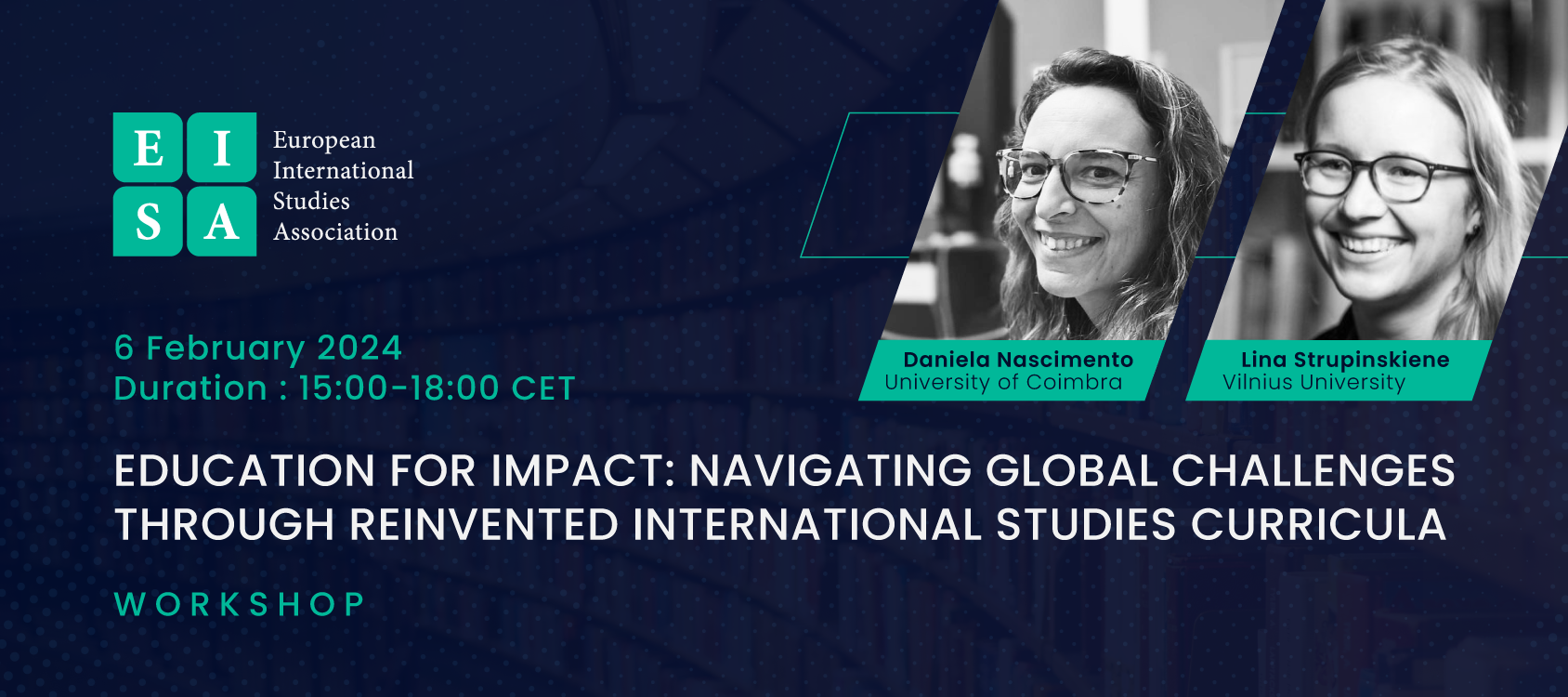Free online workshop- Education for Impact: Navigating Global Challenges through Reinvented International Studies Curricula

In this transformative age of disruption, this workshop aspires to serve as an essential platform to confront a paramount question: How should we adapt and reshape the landscape of international studies education to equip our students for the multifaceted challenges of the 21st century? From the profound impact of technology and artificial intelligence on global dynamics to the urgent concerns posed by disinformation, climate change, expanding inequalities, and expansion of violence, it is evident that the terrain of international affairs and their teaching and learning processes are continually evolving. In response to these profound shifts, our collective mission is to reevaluate, reinvent, and reinvigorate our curricula. Together, we aim to foster an education that not only prepares students to navigate the intricate webs of our interconnected world but also empowers them to proactively engage with and address these pressing global issues. This workshop is designed to be an essential resource for participants seeking a deeper understanding of the nuanced process of curriculum building tailored to our current age. It offers a unique opportunity to bridge the gap between knowledge and competences, learning outcomes and teaching and assessment methods in the context of international studies education.
Tailored for colleagues interested in crafting a Programme’s curriculum and those engaged in creating specific course outlines, the workshop promises to be a dynamic exploration of effective educational strategies. In three hours, participants will gain insights into the integration of knowledge and competences necessary for navigating the intricate webs of our interconnected world. The workshop not only aims to equip educators with the tools to navigate disruption but also to empower them to cultivate an educational environment that actively engages students in addressing the pressing global issues of our time. This enriching experience will showcase cases and best practices from Universities across Europe, offering a diverse array of perspectives and approaches to inspire change and innovation in international studies education.
Whether you are an experienced scholar seeking to refine your approach or an emerging academic eager to delve into the intricacies of curriculum and course development, this workshop is tailored to benefit both ends of the spectrum. Both our Workshop Facilitators have recently co-led a group of 14 experts in International Relations for the development of The TUNING Guidelines and Reference Points in the Design and Delivery of Degree Programmes in International Relations.
Workshop Facilitators:
Associate Professor Lina Strupinskiene, Vilnius University, Institute of International Relations and Political Science
Lina holds a BA degree in Political Science (IIRPS VU), MA degree in Conflict studies and Human rights (Utrecht University) and has defended her doctoral dissertation in 2015 on the impact of the International Criminal Tribunal for Former Yugoslavia (ICTY) on Reconciliation in Bosnia and Herzegovina (IIRPS VU). In 2010 she interned at the ICTY and was a part of the Leadership Research Team at the Office of the Prosecutor, where she worked on the case of the Bosnian Serb president Radovan Karadžić. Currently Lina works as the deputy director for studies at the IIRPS VU and teaches courses related to analysis of violent ethnic conflicts, peace studies and transitional justice. In addition, she is a member of Western Balkans Experts Pool at The European Centre of Excellence for Countering Hybrid Threats in Helsinki. Her area of expertise is the Western Balkan region. Her expertise extends beyond academia, as she has played a pivotal role in several Quality Assurance initiatives. Lina has led a national team of experts invited by the National Quality Assurance Agency to prepare a comprehensive description of the area of political science. Moreover, she took charge of the Vilnius University Guide for Study Quality Assurance and, most recently, co-led a group of 14 experts in International Relations for the development of The TUNING Guidelines and Reference Points in the Design and Delivery of Degree Programmes in International Relations (Tuning Calohex project).
Associate Professor Daniela Nascimento, Associate Professor, University of Coimbra, School of Economics
Daniela Nascimento is an Associate Professor with Habilitation at the International Relations Group at the School of Economics of the University of Coimbra where she teaches at the undergraduate and graduate levels in International Relations, including the MA in Peace, Security and Development Studies, and the PhD in International Politics and Conflict Resolution. She holds a PhD in International Politics and Conflict Resolution from the University of Coimbra, a bachelor degree in International Relations by the same University and an European Master's Degree in Human Rights and Democratisation from the Inter-European Center for Human Rights and Democratisation. She is a researcher at the Center for Social Studies, in the research line Democracy, Justice and Human Rights, She was Vice-Dean for Post-Graduate Studies at the School of Economics from February 20th, 2020 to April, 13th, 2022. She is currently elected member of the Scientific Board of the School of Economics and Counselor of the Council on Higher Military Education under the Ministry of Defense. Her research interests focus on peace studies, human rights, peacebuilding, humanitarian action, especially in the African context and Timor Leste. She has published various chapters and peer-reviewed articles in national and international journals and books, as well as participation in various research projects with national and international funding.
